Mineralization Extends to the Northwest and South,
and the Deposit Remains Open
High-Grade Gold and Cobalt Veins Intersected
TORONTO, ONTARIO, December 5, 2017: Cordoba Minerals Corp. (TSX-V:CDB; OTCQX:CDBMF) (“Cordoba” or the “Company”) is pleased to announce additional high-grade intercepts from the ongoing resource expansion diamond drilling at the Alacran Deposit, located within the 100%-owned San Matias copper-gold project in Colombia.
An additional fifteen drill holes (ACD067 to ACD081) have been completed at the Alacran Deposit that focused on improving the continuity of mineralization and testing resource expansion potential in areas located to the north, west and south of the currently defined resource. Assay results from three drill holes are pending (ACD078, 079, and 081) and are expected to be included in the updated resource estimate to be completed in the first quarter of 2018.
Results from new step-out drill holes have demonstrated continuity of the stratabound copper and gold manto-style mineralization 100 metres down-dip and 50 metres to the northwest of the currently defined resource boundary of the Alacran Deposit. Hole ACD070 reported a significant manto intercept of 57.5 metres @ 0.65% copper and 0.43 g/t gold, including a new style of high-grade epithermal vein mineralization comprising a 1.3-metre-thick vein containing 11.30 g/t gold and 1.13% cobalt. The stratabound and the vein-style mineralization are open down-dip and on-strike to the northwest as highlighted on the long section in Figure 7 and on the map on Figure 9.
Diamond drilling has continued to define the southern extension of Alacran, previously identified by hole ACD066, released in July 2017, which was collared 200 metres to the south of the Inferred Mineral Resource. Hole ACD069 was collared 65 metres southwest of ACD066 and intersected 25.4 metres @ 0.71% copper and 0.14 g/t gold.
Exploration efforts continue to add new mineralized zones into the updated Alacran resource estimate expected in Q1 2018.
Highlights (refer to Table 1 for complete drilling results)
- ACD070:
- 57.5 metres @ 0.65% copper and 0.43 g/t gold (0.98% copper equivalent [“CuEq”]; from 183.5 metres), including
- 1.3 metres @ 11.30 g/t gold, 1.13% cobalt (from 196.6 metres)
- 13.3 metres @ 0.99% copper, 0.29 g/t gold (1.21% CuEq; from 204.2 metres)
- 9.1 metres @ 1.26% copper, 0.40 g/t gold (1.56% CuEq; from 222.1 metres)
- 57.5 metres @ 0.65% copper and 0.43 g/t gold (0.98% copper equivalent [“CuEq”]; from 183.5 metres), including
- ACD074:
- 16.7 metres @ 1.24% copper, 0.13 g/t gold (1.34% CuEq; from 9.4 metres).
- 16.7 metres @ 1.24% copper, 0.13 g/t gold (1.34% CuEq; from 9.4 metres).
- ACD069:
- 25.4 metres @ 0.71% copper and 0.14 g/t gold (0.82% CuEq; from 46.0 metres), including
- 4.0 metres @ 1.39% copper, 0.39 g/t gold (1.69% CuEq; from 46.0 metres)
- 25.4 metres @ 0.71% copper and 0.14 g/t gold (0.82% CuEq; from 46.0 metres), including
- ACD071:
- 7.8 metres @ 0.57% copper and 0.67 g/t gold (1.08% CuEq; from 127.4 metres), and
- 18.6 metres @ 0.60% copper and 0.22 g/t gold (0.77% CuEq; from 174.1 metres), including
- 6.3 metres @ 1.40% copper, 0.39 g/t gold (1.70% CuEq; from 174.1 metres)
- ACD077:
- 27.1 metres @ 0.55% copper and 0.13 g/t gold (0.65% CuEq; from 24.0 metres), and
- 34.0 metres @ 0.48% copper and 0.06 g/t gold (0.53% CuEq; from 63.2 metres).
Mario Stifano, President and CEO of Cordoba Minerals, commented, “We are very pleased with the results we continue to receive from exploration drilling at Alacran. The recent results represent significant potential to extend and increase the scale of the current Alacran mineralized resource, particularly to the northwest with mineralization now extending over 1.4 kilometres in strike and up to 500 metres in lateral width. We continue to be excited and surprised by the prospectiveness of Alacran and the potential of the San Matias district with the discovery of new epithermal veins with high grade gold and cobalt that warrant continued drilling and exploration. We will continue to drill and define these highly prospective areas, and look forward to providing an updated resource estimate in Q1 2018.”
Gold-rich zones at the Alacran Deposit are not only associated with copper in the replacive stratabound mineralization but also with two different styles of epithermal vein mineralization: (1) intermediate sulphidation or CBM (“carbonate base-metal”) style veining that has a sphalerite-gold association and (2) low sulphidation fault-veins where gold is associated with arsenopyrite with cobalt. Both vein types are associated with strong carbonate-chlorite-white mica alteration and are interpreted to have occurred as part of a later geological event overprinting the stratabound manto-style copper-gold mineralization.
As shown on several of the attached sections from the on-going 3D geological modeling there is a set of sub-concordant altered dykes or sills that are spatially correlated with high grade copper-gold replacement mineralization in the wall rocks and also appears to have a close affinity with high grade gold CBM veins such as the bonanza gold grade previously reported in hole ACD036 (0.90 meters @ 4,440 g/t gold, 10.25% copper, 24.70% zinc and 347 g/t silver).
Based on the continuity of some marker stratigraphic horizons across the Deposit, there are no major faults displacing mineralization although evidence for significant east-verging reverse faulting repeating stratigraphy is found immediately to the west of the Deposit requiring follow-up drilling.
Discussion
On Section 855950mN,
- ACD068 was collared to test the northern limit of the 0.3% copper grade shell at Mina Norte under a copper-gold soil anomaly. Low grade mineralization intersected is hosted in the fine sediments and tuffs as part of Unit 2, and is affected by patchy albite-chlorite-sericite alteration overprinted by smectite with disseminated sulphides. Intersections are outline in Table 1.
On Section 855820mN (Figure 1),
- ACD070 was successful at proving down-dip continuation of the copper-gold mantos. The replacive stratabound copper-gold mineralization hosted in calcareous sediments and volcaniclastics of Unit 2 is also overprinted in this hole by a discordant metre-wide mineralized fault-vein zone filled with semi-massive sulphides. Predominance of arsenopyrite (plus minor pyrite and sphalerite) coupled with the pervasive chlorite-white mica alteration and carbonate gangue in the vein is diagnostic of a low sulphidation epithermal event. Intersections are outlined in Table 1 and include:
- 57.5 metres @ 0.65% copper and 0.43 g/t gold (0.98% CuEq; from 183.5 metres), including
- 1.3 metres @ 11.30 g/t gold, 1.13% cobalt (from 196.6 metres) as epithermal vein mineralization.
- 13.3 metres @ 0.99% copper, 0.29 g/t gold (1.21% CuEq; from 204.2 metres) as manto style mineralization.
- 9.1 metres @ 1.26% copper, 0.40 g/t gold (1.56% CuEq; from 222.1 metres) as manto style mineralization.
- 57.5 metres @ 0.65% copper and 0.43 g/t gold (0.98% CuEq; from 183.5 metres), including
- ACD076 (assays pending) was drilled 80 metres to the southwest of ACD070 and has not intersected significant mineralization but the stratabound- and the epithermal vein-style mineralization are open down-dip and on strike to the west and northwest of ACD070 as highlighted on the long section in Figure 7.
On Section 855710mN (Figure 2),
- ACD071 was collared to test the down-dip continuation of the copper-gold mantos and to infill the approximate 100 metres gap between the good intersections in holes ACD030 and ASA048. Intersections are outlined in Table 1 and include:
- 7.8 metres @ 0.57% copper and 0.67 g/t gold (1.08% CuEq; from 127.4 metres) in calcareous sediments of Unit 2, and
- 18.6 metres @ 0.60% copper and 0.22 g/t gold (0.77% CuEq; from 174.1 metres) in fine tuffs of Unit 2, including
- 6.3 metres @ 1.40% copper, 0.39 g/t gold (1.70% CuEq; from 174.1 metres)
- This weaker stratabound copper-gold mineralization remains open down-dip as highlighted on the cross section in Figure 2.
- ACD077 was successful at infilling the 110 metres gap between the good intersections in holes ACD060 and ACD010. Intersections are outlined in Table 1 and include:
- 27.1 metres @ 0.55% copper and 0.13 g/t gold (0.65% CuEq; from 24.0 metres) in breccias and tuffs of Unit 2, and
- 34.0 metres @ 0.48% copper and 0.06 g/t gold (0.53% CuEq; from 63.3 metres) in tuffs of Unit 2, and
- 11.0 metres @ 1.47% copper and 0.79 g/t gold (2.07% CuEq; from 114.4 metres) in tuffs at the bottom of Unit 2. This intercept is separated from the previous one by a late-mineral diorite sill.
On Section 855415mN (Figure 3),
- ACD074 was planned to infill the 130 metres gap between the good intersections in holes ACD064 and ACD033. Intersections are outlined in Table 1, including:
- 16.7 metres @ 1.24% copper, 0.13 g/t gold (1.34% CuEq; from 9.4 metres) in calcareous sediments and welded ash-flow tuffs of Unit 2.
- ACD080A (assays pending) drilled 60 metres to the west of the intercept in ASA015 has not intersected significant mineralization and effectively closes off the mineralization down-dip on this section, as noted in Figure 3.
On Section 855140mN (Figure 4),
- ACD073 successfully infilled the approximate 100 metres gap between the intersections in holes ASA043 and ASA047 with multiple intersections in tuffs and calcareous sediments of Unit 2 as outlined in Table 1, including:
- 4.5 metres @ 2.60% copper, 2.37 g/t gold (4.40% CuEq; from 140.5 metres), and
- 11.4 metres @ 0.56% copper and 0.29 g/t gold (0.78% CuEq; from 153.1m)
- The stratabound copper-gold mineralization remains open down-dip as highlighted on the cross section shown in Figure 4.
- ACD078 (assays pending) is an infill hole that proved the continuity of mineralization between the intercepts in ASA011 and ACD038 as shown in Figure 4. Chalcopyrite mineralization is hosted both in the calcareous mudstones above the marker fossiliferous limestone (as in ASA011) and in the tuffs below (as in ACD038).
On Section 854740mN (Figure 5), hole ACD081 was drilled as a step back hole to extend 60 metres down-dip the high-grade intersected by ACD066 (48 metres @ 0.70% copper and 0.19 g/t gold; previously released in July 2017). ACD066 was collared to test outcropping mineralization and an induced polarization (“IP”) anomaly identified 200 metres to the south of the Inferred Mineral Resource shell published in January 2017. ACD081 has intersected the down-dip continuation of the same magnetite-chalcopyrite manto hosted in the laminated calcareous mudstones which are stratigraphically part of Unit 2. High grade mineralization is expected as shown in Figure 5.
On Section 854730mN (Figure 6), two drill holes were collared to further step-out to the south of ACD066. These holes have defined an additional strike extent of 70 metres and a dip extent of 70 metres, as shown on the map in Figure 9 and on sections in Figures 6 and 8.
- ACD067 intersected oxidized to leached copper-gold mineralization starting at surface hosted by the laminated calcareous mudstones. These are replaced by semi-massive banded silica-apatite, magnetite and sulphides/oxides, with lesser chloritized lithic tuffs at the bottom of the intersection. Intersections are outlined in Table 1 and on the cross section in Figure 6.
- ACD069 drilled as a step back from ACD067 has also intersected mineralization hosted by the Unit 2 laminated calcareous mudstones, which are replaced by semi-massive silica, magnetite and sulphides—similar to holes ACD066 and ACD067. Intersections are outlined in Table 1 and on the cross section in Figure 6, including:
- 25.4 metres @ 0.71% copper and 0.14 g/t gold (0.82% CuEq; from 46.0 metres), including
- 4.0 metres @ 1.39% copper, 0.39 g/t gold (1.69% CuEq; from 46.0 metres)
- 25.4 metres @ 0.71% copper and 0.14 g/t gold (0.82% CuEq; from 46.0 metres), including
On Section 854650mN (Figure 8), drill hole ACD072 was collared an additional 110 metres southwest of ACD066 and only intersected low grade copper in the magnetite-rich manto that replaces the laminate calcareous mudstones, suggesting that mineralization is closing off down-dip and to the south as shown on oblique section in Figure 8.
Holes ACD075, 076 and 080a did not encounter significant mineralization and were not sampled. Refer to the map in Figure 9 for collar locations.
Alacran Copper-Gold Project
The Alacran copper-gold system is located within the San Matias copper-gold project in the Department of Cordoba, Colombia, 200 kilometres north of Medellin. San Matias comprises of a 20,000-hectare land package and contains several known areas of porphyry copper-gold and iron oxide copper gold, and/or carbonate replacement deposit mineralization and gold veins.
The Alacran copper-gold system is located on a topographic high in gently rolling countryside, optimal for potential open-pit mining. Site access and infrastructure are considered to be favourable.
The Inferred Mineral Resources at Alacran are currently 53.5 million tonnes @ 0.70% copper and 0.37 g/t gold. Alacran is approximately two kilometres southwest of the Company’s Montiel porphyry copper-gold discovery, where drilling intersected 101.1 metres @ 1.0% copper and 0.65 g/t gold (previously reported in DDH-004), and two kilometres northwest of the Costa Azul porphyry copper-gold discovery, where drilling intersected 86.6 metres @ 0.62% copper and 0.51 g/t gold (previously reported in CADDH003).
The copper-gold mineralization at Alacran is associated with stratabound replacement of a faulted calcareous marine volcano-sedimentary sequence. The Deposit comprises moderately- to steeply-dipping stratigraphy that is mineralized as a series of sub-parallel replacement-style zones and associated disseminations. The mineralization is composed of multiple overprinting hydrothermal events, and the main mineralizing phase is comprised of chalcopyrite-pyrrhotite-pyrite that appears to overprint an early magnetite metasomatic event.
Technical Information
The technical information in this release has been reviewed and verified by Dale A. Sketchley, a Qualified Person for the purpose of National Instrument 43-101. Mr. Sketchley is a consultant to Cordoba Minerals and is considered independent under National Instrument 43-101. Mr. Sketchley is a geologist with over 40 years in the mineral exploration, mining, and consulting industry. He is a Member of the Association of Professional Engineers and Geoscientists of British Columbia (APEGBC) and the Canadian Institute of Mining and Metallurgy (CIMM).
Copper-equivalent values have been calculated using a US$1,300 per ounce gold price and US$2.50 per pound copper price.
Cordoba utilizes a comprehensive industry-standard QA/QC program. HQ and NQ diamond drill core is sawn lengthwise in two halves, and one half is sampled and shipped to a sample preparation laboratory. The other half of the core is stored in a secure facility for future assay verification. All samples are prepared at ALS Minerals Laboratory in Medellin, Colombia, and assayed at ALS Minerals Laboratory in Lima, Peru. ALS Minerals operates in accordance with ISO/IEC 17025. Gold is determined by 50 g fire assay with an AAS finish. An initial multi-element suite comprising copper, molybdenum, silver and additional elements is analyzed by four-acid digest with an ICP-ES or ICP-MS finish. All samples with copper values over 2000 ppm are re-assayed by a method for higher grades, which also uses a four-acid digest with an ICP-ES finish. Certified reference materials, blanks, and duplicates are inserted into the sample stream to monitor laboratory performance.
The Alacran preliminary Inferred Mineral Resource estimate was completed by Mining Associates Limited and reported by the Company on January 5, 2017, and is in accordance with National Instrument 43-101 and the 2014 Canadian Institute of Mining (CIM) definition standards. Inferred Mineral Resources are considered to be too speculative geologically to have the economic considerations applied to them to be categorized as Mineral Reserves. Mineral Resources that are not Mineral Reserves do not have demonstrated economic viability.
About Cordoba Minerals
Cordoba Minerals Corp. is a Toronto-based mineral exploration company focused on the exploration and acquisition of copper and gold projects in Colombia. Cordoba is currently focused on its 100%-owned San Matias Copper-Gold Project, which includes the advanced-stage Alacran Deposit located in the Department of Cordoba. For further information, please visit www.cordobaminerals.com.
ON BEHALF OF THE COMPANY
Mario Stifano, President and CEO
Cordoba Minerals Corp.
For further information, please contact:
Evan Young, Director, Investor Relations
Email: eyoung@cordobamineralscorp.com
Phone: +1 (647) 808-2141
Neither the TSX Venture Exchange nor the Investment Industry Regulatory Organization of Canada accepts responsibility for the adequacy or accuracy of this release.
Forward-Looking Statements
This news release includes certain “forward-looking information” within the meaning of Canadian securities legislation. Forward-looking statements include predictions, projections and forecasts and are often, but not always, identified by the use of words such as “seek”, “anticipate”, “believe”, “plan”, “estimate”, "forecast", “expect”, "potential", "project", "target", "schedule", budget" and “intend” and statements that an event or result “may”, “will”, “should”, “could” or “might” occur or be achieved and other similar expressions and includes the negatives thereof. Forward-looking statements include, without limitation, (i) that recent results represent significant potential to extend and increase the scale of the current mineralized resource; and (ii) that an updated resource estimate will be completed in Q1 2018. Forward-looking statements are based on a number of assumptions and estimates that, while considered reasonable by management based on the business and markets in which Cordoba operates, are inherently subject to significant operational, economic, and competitive uncertainties and contingencies. All statements other than statements of historical fact included in this release, including, without limitation, statements regarding the potential of the Company’s properties are forward-looking statements that involve various risks and uncertainties. There can be no assurance that such statements will prove to be accurate and actual results and future events could differ materially from those anticipated in such statements. Forward-looking statements are based on a number of material factors and assumptions. Important factors that could cause actual results to differ materially from Company’s expectations include actual exploration results, changes in project parameters as plans continue to be refined, future metal prices, availability of capital and financing on acceptable terms, general economic, market or business conditions, uninsured risks, regulatory changes, delays or inability to receive required approvals, and other exploration or other risks detailed herein and from time to time in the filings made by the Company with securities regulators. Although the Company has attempted to identify important factors that could cause actual actions, events or results to differ from those described in forward-looking statements, there may be other factors that cause such actions, events or results to differ materially from those anticipated. There can be no assurance that forward-looking statements will prove to be accurate and accordingly readers are cautioned not to place undue reliance on forward-looking statements which speak only as of the date of this news release. The Company disclaims any intention or obligation, except to the extent required by law, to update or revise any forward-looking statements, whether as a result of new information, future events or otherwise.
Figure 1: Section 855820mN
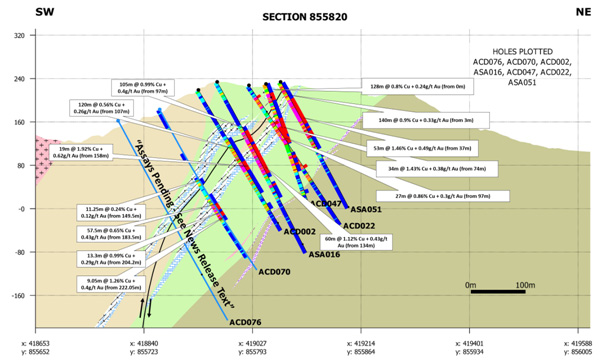
Figure 2: Section 855710mN
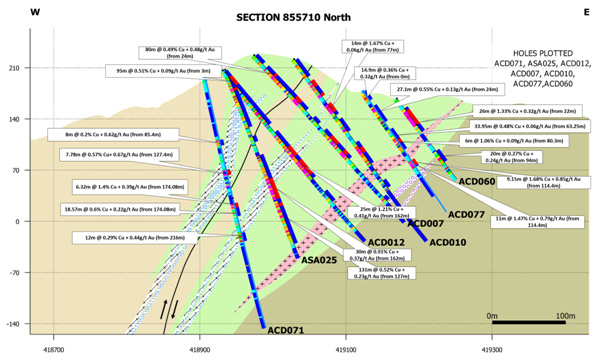
Figure 3: Section 855415mN
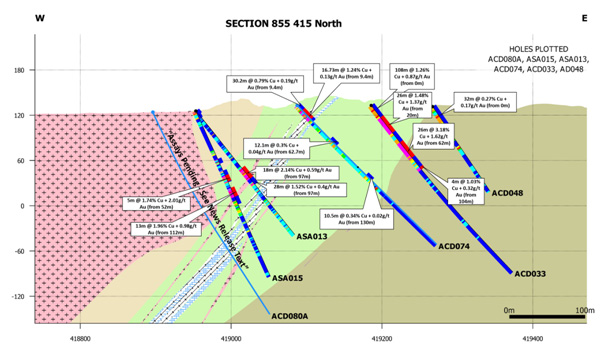
Figure 4: Section 855140mN
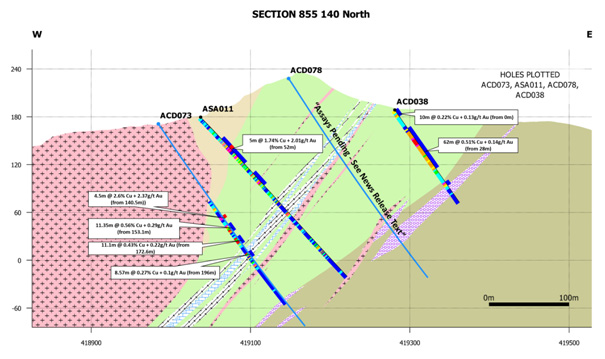
Figure 5: Section 854740mN
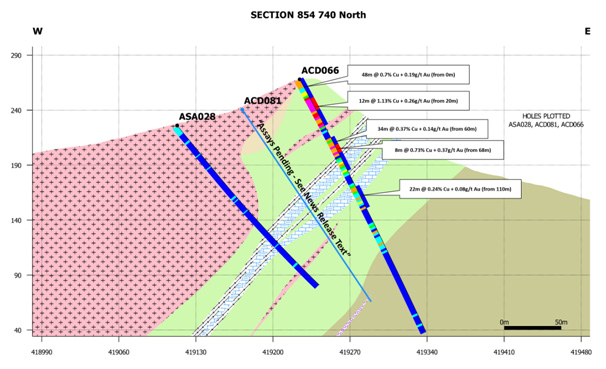
Figure 6: Section 854730mN
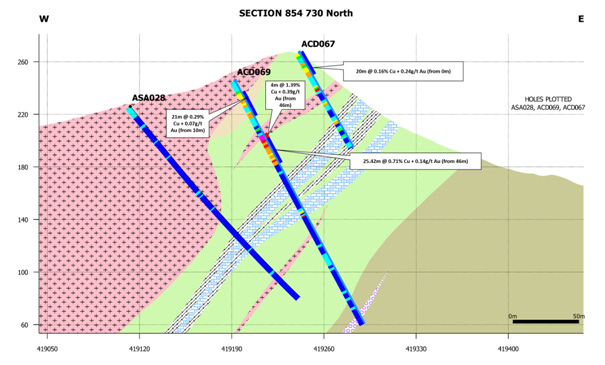
Figure 7: Longitudinal section 418980mE
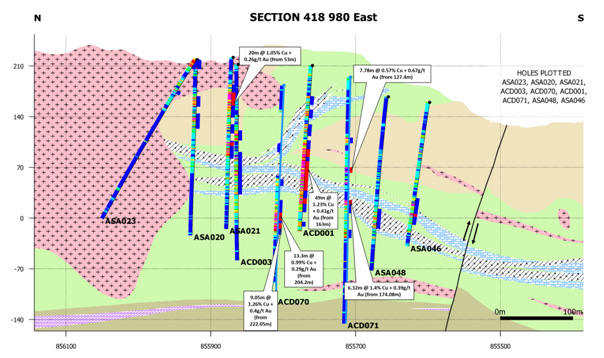
Figure 8: Oblique section 854760mN
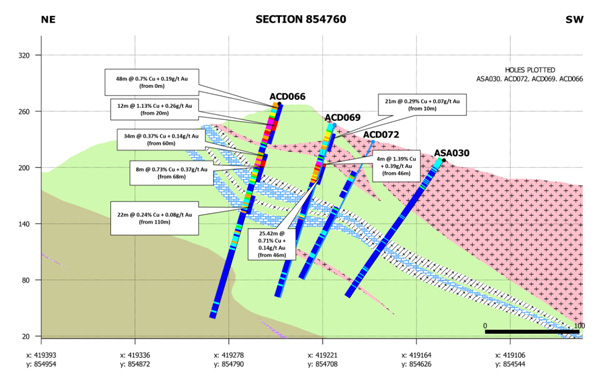

Figure 9: Map of recent drilling at Alacran
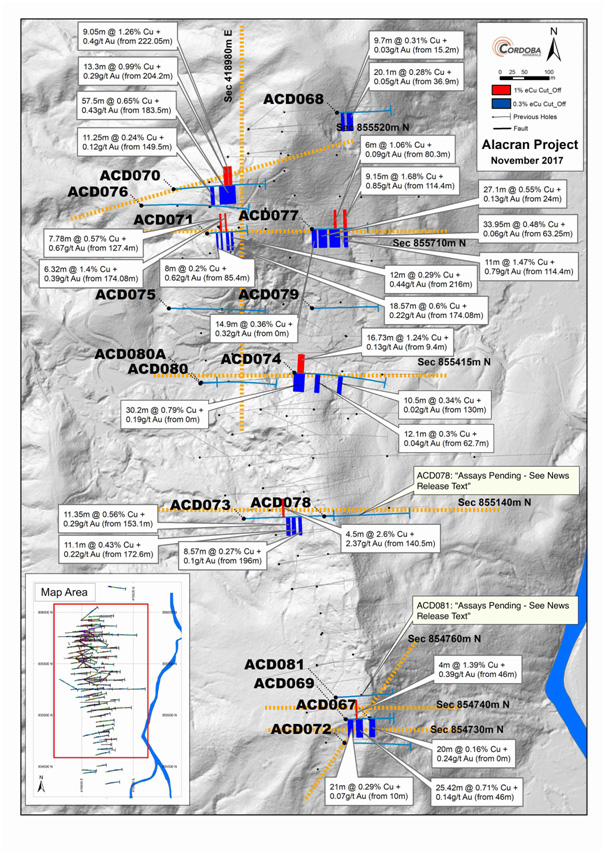
Table 1 – Significant intercepts from recent Alacran drilling
| Hole ID | From | To | Interval (m) | CuEq (%) |
Cu (%) |
Au (g/t) |
Cut-off (%CuEq) | True Thickness (approx % of intercept width) |
|---|---|---|---|---|---|---|---|---|
| ACD067 | 0.0 | 20.0 | 20.0 | 0.34 | 0.16 | 0.24 | 0.3 | 90-100% |
| ACD068 | 15.2 | 24.9 | 9.7 | 0.33 | 0.31 | 0.03 | 0.3 | 90-100% |
| ACD068 | 36.9 | 57.0 | 20.1 | 0.32 | 0.28 | 0.05 | 0.3 | |
| ACD069 | 10.0 | 31.0 | 21.0 | 0.34 | 0.29 | 0.07 | 0.3 | 90-100% |
| ACD069 | 46.0 | 71.4 | 25.4 | 0.82 | 0.71 | 0.14 | 0.3 | |
| ACD069 | 46.0 | 50.0 | 4.0 | 1.69 | 1.39 | 0.39 | 1.0 | |
| ACD070 | 149.5 | 160.8 | 11.3 | 0.33 | 0.24 | 0.12 | 0.3 | 90-100% |
| ACD070 | 183.5 | 241.0 | 57.5 | 0.98 | 0.65 | 0.43 | 0.3 | |
| ACD070 | 204.2 | 217.5 | 13.3 | 1.21 | 0.99 | 0.29 | 1.0 | |
| ACD070 | 222.1 | 231.1 | 9.1 | 1.56 | 1.26 | 0.4 | 1.0 | |
| ACD071 | 85.4 | 93.4 | 8.0 | 0.67 | 0.20 | 0.62 | 0.3 | 90-100% |
| ACD071 | 127.4 | 135.2 | 7.8 | 1.08 | 0.57 | 0.67 | 0.3 | |
| ACD071 | 127.4 | 135.2 | 7.8 | 1.08 | 0.57 | 0.67 | 1.0 | |
| ACD071 | 174.1 | 192.7 | 18.6 | 0.77 | 0.60 | 0.22 | 0.3 | |
| ACD071 | 174.1 | 180.4 | 6.3 | 1.70 | 1.40 | 0.39 | 1.0 | |
| ACD071 | 216.0 | 228.0 | 12.0 | 0.62 | 0.29 | 0.44 | 0.3 | |
| ACD073 | 140.5 | 145.0 | 4.5 | 4.40 | 2.60 | 2.37 | 1.0 | 90-100% |
| ACD073 | 153.1 | 164.5 | 11.4 | 0.78 | 0.56 | 0.29 | 0.3 | |
| ACD073 | 172.6 | 183.7 | 11.1 | 0.60 | 0.43 | 0.22 | 0.3 | |
| ACD073 | 196.0 | 204.6 | 8.6 | 0.35 | 0.27 | 0.1 | 0.3 | |
| ACD074 | 9.4 | 30.2 | 20.8 | 1.14 | 1.05 | 0.12 | 0.3 | 90-100% |
| ACD074 | 9.4 | 26.1 | 16.7 | 1.34 | 1.24 | 0.13 | 1.0 | |
| ACD074 | 62.7 | 74.8 | 12.1 | 0.33 | 0.30 | 0.04 | 0.3 | |
| ACD074 | 130.0 | 140.5 | 10.5 | 0.36 | 0.34 | 0.02 | 0.3 | |
| ACD077 | 0.0 | 14.9 | 14.9 | 0.60 | 0.36 | 0.32 | 0.3 | 90-100% |
| ACD077 | 24.0 | 51.1 | 27.1 | 0.65 | 0.55 | 0.13 | 0.3 | |
| ACD077 | 63.3 | 97.2 | 34.0 | 0.53 | 0.48 | 0.06 | 0.3 | |
| ACD077 | 80.3 | 86.3 | 6.0 | 1.13 | 1.06 | 0.09 | 1.0 | |
| ACD077 | 114.4 | 125.4 | 11.0 | 2.07 | 1.47 | 0.79 | 0.3 | |
| ACD077 | 114.4 | 123.6 | 9.2 | 2.32 | 1.68 | 0.85 | 1.0 |
Table 2 – Significant epithermal vein intercept from recent Alacran drilling
| Hole ID | From | To | Interval (m) | Au (g/t) |
Co (%) |
|---|---|---|---|---|---|
| ACD070 | 196.6 | 197.9 | 1.3 | 11.3 | 1.13 |
- 0.3% CuEq cut off with 6m maximum internal dilution and a 6m minimum width.
- 1.0% CuEq cut off uses 4m maximum internal dilution and 4m minimum width.
- True width intervals of the mineralization are estimated in the rightmost column
- Copper equivalent (“CuEq”) calculations assume a US$2.50/lb copper price and a US$1,300/Oz gold price.
- For intercept calculations: sample assays of copper, gold and copper equivalent are all capped to 10% Cu, 10 g/t Au, and 10 % CuEq.
